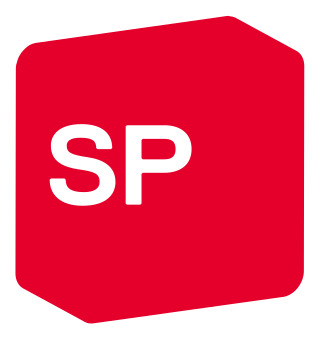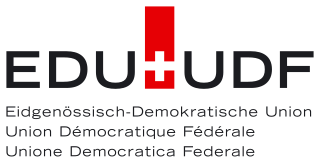Six national referendums were held in Switzerland during 2015, the first of which were held on 8 March. [1]
| This article is part of a series on the |
 |
|---|
Six national referendums were held in Switzerland during 2015, the first of which were held on 8 March. [1]
Two referendums were held on 8 March. [2] The family initiative proposal proposed that child and education allowances should be exempt from income tax, [2] whilst second initiative called for the introduction of a tax on non-renewable energy, [2] with the higher cost of energy consumption compensated by the abolition of VAT. [2] The family initiative was initiated by the Christian Democratic People's Party and the energy initiative was initiated by the Green Liberal Party. [3] The Swiss government recommended the rejection of both initiatives, [2] and both were rejected by voters.
The failed energy initiative received worst vote result for an initiative since 1929. [3]
| Question | For | Against | Invalid/ blank | Total votes | Registered voters | Turnout | Cantons for | Cantons against | Result | ||||
|---|---|---|---|---|---|---|---|---|---|---|---|---|---|
| Votes | % | Votes | % | Full | Half | Full | Half | ||||||
| Family initiative | 537,795 | 24.6 | 1,650,109 | 75.4 | 22,987 | 2,210,891 | 5,254,965 | 42.07 | 0 | 0 | 20 | 6 | Rejected |
| Non-renewable energy tax | 175,405 | 8.0 | 2,010,326 | 92.0 | 24,390 | 2,210,121 | 41.06 | 0 | 0 | 20 | 6 | Rejected | |
| Source: Government of Switzerland | |||||||||||||
Four referendums were held on 14 June 2015, covering a constitutional amendment regarding reproductive medicine and human gene technology, popular initiatives on scholarships and inheritance tax and a modification of the federal law on radio and television reducing the annual licence fee from 462 to 400 Francs. [4]
| Question | For | Against | Invalid/ blank | Total votes | Registered voters | Turnout | Cantons for | Cantons against | Result | ||||
|---|---|---|---|---|---|---|---|---|---|---|---|---|---|
| Votes | % | Votes | % | Full | Half | Full | Half | ||||||
| Reproductive medicine/gene technology | 1,377,613 | 61.9 | 846,865 | 38.1 | 66,515 | 2,290,993 | 5,265,120 | 43.5 | 17 | 3 | 3 | 3 | Accepted |
| Scholarships | 610,284 | 27.5 | 1,611,911 | 72.5 | 65,360 | 2,287,555 | 43.4 | 0 | 0 | 20 | 6 | Rejected | |
| Inheritance tax | 657,851 | 29.0 | 1,613,982 | 71.0 | 29,487 | 2,301,320 | 43.7 | 0 | 0 | 20 | 6 | Rejected | |
| Federal law on radio and television | 1,128,522 | 50.1 | 1,124,873 | 49.9 | 44,568 | 2,297,963 | 43.6 | Accepted | |||||
| Source: Government of Switzerland 1, 2, 3, 4 | |||||||||||||

Switzerland, officially the Swiss Confederation, is a landlocked country located in west-central Europe. It is bordered by Italy to the south, France to the west, Germany to the north and Austria and Liechtenstein to the east. Switzerland is geographically divided among the Swiss Plateau, the Alps and the Jura; the Alps occupy the greater part of the territory, whereas most of the country's population of 9 million are concentrated on the plateau, which hosts its largest cities and economic centres, including Zürich, Geneva, and Basel.

The government of Switzerland is a federal state with direct democracy.

A referendum is a direct vote by the electorate on a proposal, law, or political issue. This is in contrast to an issue being voted on by a representative. This may result in the adoption of a new policy or specific law, or the referendum may be only advisory. In some countries, it is synonymous with and also known as plebiscite, votation, popular consultation, ballot question, ballot measure, or proposition.

Direct democracy or pure democracy is a form of democracy in which the electorate decides on policy initiatives without elected representatives as proxies. This differs from the majority of currently established democracies, which are representative democracies. The theory and practice of direct democracy and participation as its common characteristic was the core of work of many theorists, philosophers, politicians, and social critics, among whom the most important are Jean Jacques Rousseau, John Stuart Mill, and G.D.H. Cole.

The Social Democratic Party of Switzerland, or Swiss Socialist Party, is a political party in Switzerland. The SP has had two representatives on the Federal Council since 1960 and received the second-highest number of votes in the 2019 Swiss federal election.
Same-sex marriage has been legal in Switzerland since 1 July 2022. Legislation to open marriage to same-sex couples passed the Swiss Parliament in December 2020. The law was challenged in a referendum on 26 September 2021 by opponents of same-sex marriage and was approved with the support of 64% of voters and a majority in all 26 cantons. The law went into force on 1 July 2022. A provision of the law permitting same-sex marriages performed abroad to be recognised in Switzerland took effect on 1 January 2022. Switzerland was the seventeenth country in Europe and the 30th in the world to allow same-sex couples to marry.

The Federal Democratic Union of Switzerland is a national-conservative political party in Switzerland. Its ideology is politically conservative, Protestant fundamentalist, and right-wing populist. It is similar to the Christian right in the United States, and its top goals were to promote "biblical values" and oppose other cultures and values.
Voting in Switzerland is the process by which Swiss citizens make decisions about governance and elect officials. The history of voting rights in Switzerland mirrors the complexity of the nation itself. The polling stations are opened on Saturdays and Sunday mornings but most people vote by post in advance. At noon on Sunday, voting ends and the results are usually known during the afternoon.
Nuclear power in Switzerland is generated by three nuclear power plants, with a total of four operational reactors (see list below). Since 1985, nuclear power has been contributing approximately 40% of Switzerland's electrical energy. In 2022, it produced 23 terawatt-hours (TWh) of electricity, and accounted for 37% of the nation's gross electricity generation of 62 TWh, while 55% was produced by hydroelectric plants and 8% came from conventional thermal power stations and non-hydro renewable energy sources.
Ten referendums were held in Switzerland during 2008. The first two were held on 24 February on business tax reform and aircraft noise. A further three were held on 1 June on public information campaigns, naturalisation and health reform. The final five were held on 30 November on legalising cannabis, making the pension age flexible, restricting the right of appeal of associations against construction projects, amending the constitutional article on narcotics and eliminating the statute of limitations with respect to pornographic crimes against children.
Twelve national referendums were held in Switzerland during 2012. On 11 March voters across the country were asked five questions on employment leave, second houses, building society savings, the Fixed Book Price Agreement and gambling revenues. On 17 June there were three questions on healthcare, foreign policy and home buying. On 23 September there were three on a smoking ban, secure housing in old age and music lessons at school. A final referendum was held on 25 November on the Animal Diseases Act.
Eleven national referendums were held in Switzerland during 2013. Voters approved six proposals related to spatial planning, executive pay, family policy, amendments to the laws on asylum and epidemics and an increase in the length of petrol station shop opening hours. The other five proposals on directly electing the Federal Council, abolishing compulsory military service, limiting salaries in a company to 12 times the lowest paid worker, tax credits for stay-at-home parents and an increase in road tax were rejected.
A referendum is a direct vote in which an entire electorate is asked to either accept or reject a particular proposal. This article summarises referendum laws and practice in various countries.
Twelve national referendums were held in Switzerland during 2014.

In Switzerland, the federal popular initiative "against mass immigration" was a referendum that aimed to limit immigration through quotas, as it had been prior to the bilateral treaties between Switzerland and the European Union (EU) launched in 2002.
Thirteen national referendums were held in Switzerland during 2016.
Seven national referendums were held in Switzerland during 2017. Polling took place on 12 February, 21 May and 24 September, whilst no referendum was scheduled for the November date.
Ten national referendums were held in Switzerland in 2018. Voting took place on 4 March, 10 June, 23 September and 25 November.
Several federal referendums were held in Switzerland in 2020, with voting on 9 February, 27 September and 29 November. Voting was also planned for 17 May, but was postponed due to the COVID-19 pandemic.

Federal referendums were held in Switzerland on 13 February, 15 May and 25 September 2022. Swiss referendums take three forms: popular initiatives, which are citizen proposals to create a new law and require 100,000 valid signatures on a petition to get on the ballot; facultative or optional referendums, which are citizen proposals to approve or reject a piece of existing law and require 50,000 valid signatures on a petition to get on the ballot; and mandatory referendums, which are required to revise the constitution, join an international organization or introduce emergency federal legislation for over a year.